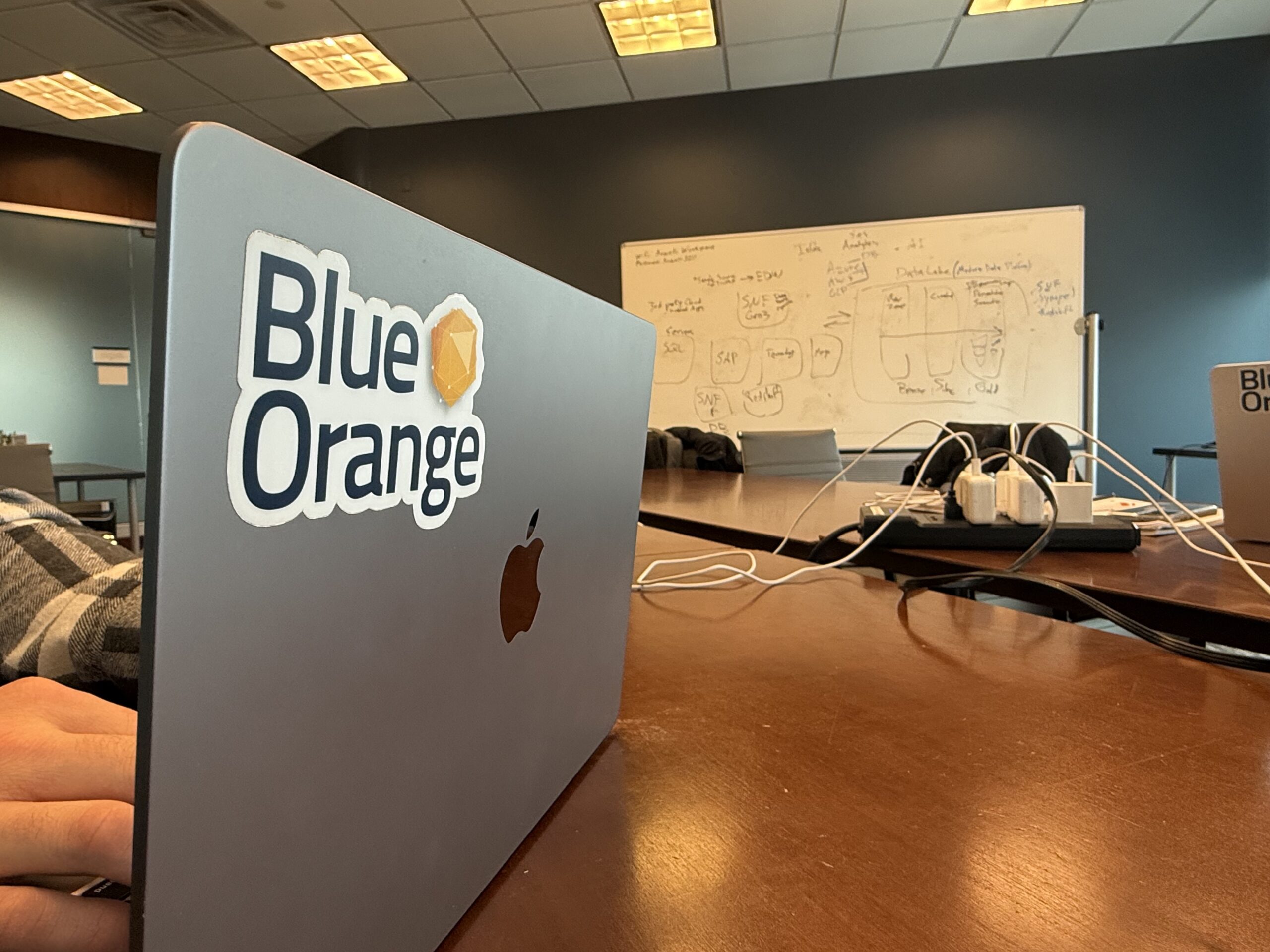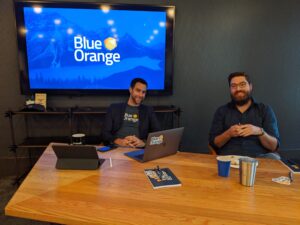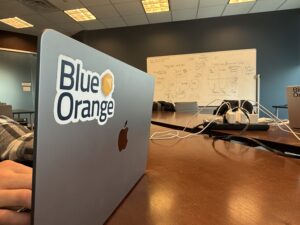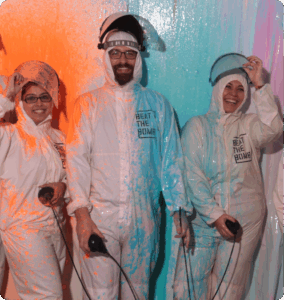10 Lessons from 10 Years as a Founder

Blue Orange Digital’s 10th Anniversary
Ten years ago, I spun the firm out of the sale of my last company to kick off another that was rooted in my love of tech, data, and building systems make that improve processes.
After a decade of running Blue Orange Digital, I thought I’d share 10 things I’ve learned from scaling this company to 150 people and over 250 projects.
1. Be a Camel, Not a Unicorn.
When I exited Good.Co in 2015, I welcomed the breakup from Silicon Valley. The ethos that originally drew me there (first-principle thinking, meritocracy, and VC-backed disruption) had morphed into a distasteful homogeny of groupthink and founder sycophancy that prioritized hype over logic and reasonability.
In the Valley, everyone chased unicorn status, but since shifting from VC-backed startups to P&L-based companies, I’ve discovered a different corporate spirit animal: the camel. A camel company is a well-positioned business built to be anti-fragile, capable of surviving changing market conditions. While high-flying startups burn cash for growth, camels prioritize sustainability and revenue.
This shift proved refreshing. Focusing on profitability and cash flow rather than growth at all costs may not generate TechCrunch headlines, but it keeps you alive when funding droughts arrive. Growing a company with real customers and real income provides something more valuable than media attention: survival.
Blue Orange started small and scrappy, measuring value through client contentment and success. That grounded approach has been our secret to longevity. The lesson is simple: unicorns are rare and mythical, but camels are built to endure in the real world.

2. Customers Are Your Real Investors
Early in my career I believed the mantra “he who has the gold (VCs), makes the rules.” Now, I know your customers are the ones who truly fund your business. Their checks keep the lights on and, ultimately, are the scorecard for market value.
We made client success our north star, which is a lesson I took from running a professional services firm where each client’s outcome can make or break you. Obsess over delivering value and listen intently to their needs. This customer obsession should guide your strategy more than anything else.
In the data business, we resisted the temptation to build some flashy product no one asked for, and instead, doubled down on solving clients’ problems (even when it meant saying “no” to projects that weren’t a good fit). Satisfied clients generate revenue, referrals, and long-term stability, which is far more valuable than a one-time infusion of VC cash.
In short, treat your clients like the lifeblood they are. They’re not just paying for a service. They’re investing in your company’s future every time you deliver for them.

3. Raise Money Only When You Need To (On Your Terms)
Coming from the venture-backed SaaS world, I initially felt every startup had to chase funding. The truth: outside capital is a tool, not a trophy. Bootstrapping is hard, but it also enabled a nimble and adaptive culture that became a competitive advantage. We bootstrapped for as long as possible, and it was liberating. Not every company needs venture capital to succeed, and taking funding too early or on bad terms can be a trap.
I also felt ‘less-than’ in the early days. Use funding to scale, not to survive. If you do seek investors, pick the right moment, ideally when you’ve got leverage like solid profits or a proven model. Saying “yes” to funding is like taking on a climbing partner: rope up with someone you trust, or you’ll regret it on the way down.
In my journey, choosing private equity growth funding later on made far more sense than chasing flashy deals early to dilute the cap table and lose flexibility. It’s okay to be old-school. Build a company that can earn its keep, and then use funding as jet fuel, not life support.

4. Survive First, Thrive Second:
As an adventure sport athlete (paraglider, climber, backcountry skier), I love exploring limits of risk vs reward, but one thing extreme sports teach you is first, don’t die.
In business, the first rule is similar: survival is the number-one strategy. Growth is useless if you run out of cash or blow up your team. We prioritized steady endurance over breakneck expansion. This sometimes meant growing slower than the hottest startups, but it also meant we were still around year after year, compounding our wins.
I’ve learned that being resilient beats being rapid, especially in a services business. When the economy threw punches (hello, pandemic), our goal was simply to last through the storm intact to fight another day. Focus on fundamentals like positive cash flow, a diversified client base, and a buffer of savings.
If you can survive the worst, you’ll get the chance to thrive when conditions improve. In the startup world, last one standing wins.

5. Grit Trumps Genius:
Ten years in, I can definitively say success is less about who’s the smartest in the room (though smarts definitely help) and more about who’s the most determined. Grit is the ultimate founder superpower.
Building a company is an endurance test. Much like a marathon, you’ll face exhaustion, fear, and moments where an easier path tempts you, but perseverance pays. Carol Duckworth writes about this in her excellent book, Grit, “Contrary to popular opinion, success doesn’t depend on talent. It depends on intensely focusing on a goal with passion and perseverance.”
You don’t have to be a genius to win in business (in fact, thinking you’re one is a handicap). What you need is the willingness to grind it out when things get tough. I’ve had deals fall through, products fail, and sleepless nights worrying about payroll. The only reason we’re still here is because we didn’t quit. We adapted, learned, and kept going.
Every founder says it, because it’s true: resilience and grit beat IQ and novelty. So wear your battle scars with pride. They’re proof you had the grit to keep moving forward when others would have given up.

6. Your Team Is Your Climbing Rope
As a lifelong rock climber, I’ve learned to trust my gear and climbing partners. My safety is literally hanging on that rope. Similarly, in business your team is everything. This may sound cliché, but a founder’s job is eventually to make themselves obsolete in day-to-day operations by empowering people who are better than you in each role.
Early on, I tried to do it all (typical founder control freak behavior). With growth, I learned to hire smart, driven folks and then get out of their way. We invested in a team culture that prizes autonomy, mastery, and purpose. (As one founder quipped, “Bean bags and free beer is not good company culture”, and I agree.
Real culture is built on trust, flexibility, and shared values (not gimmicks). Promoting from within beats hiring mercenaries. Those who grew with the company had invaluable context and loyalty. Is it more expensive to nurture and retain great people? Maybe in the short run, but it’s the best long term investment you’ll ever make.
Take care of your team, and they will take care of your clients. We win (or lose) together because we’re tied to two sides of the same rope.

7. Focus Beats FOMO
The tech industry is full of shiny objects: new markets, hot technologies (hello IoT, AI!), and the fear of missing out can pull you in every direction. But one of the hardest lessons I’ve learned is the power of focus.
In a professional services firm, it’s tempting to say “yes” to every client request or trending buzzword project. We resisted that urge, and it’s been crucial to our quality (and our sanity). We chose to specialize in what we’re truly great at (data and analytics engineering) instead of being a jack-of-all-trades consulting shop. That focus helped us build a strong reputation in modern data.
Saying no, whether to a misaligned client or a non-core opportunity, can feel like a gamble, but it protects your bandwidth to say yes to the right things. The common advice is “pivot fast,” but my take is pivot deliberately and only when your current path is truly a dead end.
Don’t chase competition or trends blindly. Our big leaps (expanding services, opening a new office, and productized offerings) were always on our own timing and based on careful reading of the “weather conditions” (market demand).
Focus isn’t boring. Focus is how you finish. FOMO is just noise.

8. Burnout Is Not a Badge of Honor
The startup grind culture will have you believe that 80-hour weeks and constant hustle are a badge of honor. Burnout is a failure, not a trophy. In fact, 72% of founders report experiencing burnout, and many cite it as a major factor in their startup’s failure.
I’ve walked up to that line myself a few times. There were stretches in the past decade where I neglected sleep, family, and my own health in the name of the business, and it was absolutely counterproductive in the long run. You think you’re being hardcore when really, you’re running on fumes and making bad decisions.
My adrenaline hobbies (paragliding, base jumping, skiing) might seem extreme, but they actually forced me to disconnect and recharge. You can’t think about client contracts when you’re literally flying off a mountain, and that mental reset is crucial.
So, founders, please take care of yourselves: set boundaries, take breaks, and don’t buy into the toxic myth that constant grind = success. A burned-out founder is as useful as a burned-out fuse. Your company needs you at 100%, not perpetually fried. Work hard, yes, but also play hard. I find jumping off cliffs with a parachute works, but yoga or a simple walk works too!
In short, sustainable growth applies to you, not just your startup.

9. Keep Reinventing Yourself
Ten years in tech feels like a century with how fast things change. One lesson from the data/AI space is adapt or die. You must continuously learn and evolve. The skills and playbook that got you from year 1 to year 5 might not carry you to year 10.
In my case, I had to reinvent myself from a product-focused SaaS founder to a client-services CEO. Early on, I was deep in the weeds of data engineering and data science, but later I had to become more of a strategist, then a people manager, and now somewhat of a public spokesperson for the company. Each phase required shedding old tasks and ego, and picking up new abilities. I also had to stay on top of industry shifts (from big data to cloud to machine learning to today’s GenAI boom) and discern which trends matter versus hype.
Never stop learning. It’s contrarian in the sense that many founders imagine they’ll “coast” once the business matures. Nope. The minute you coast, you fall behind. I treated my journey like progressing in climbing grades or golf handicaps: there’s always room to improve. Read voraciously, seek mentors, collaborate with colleagues, take courses, hire coaches, whatever keeps you sharp.
The best founders I know remain students of the game. Embrace the fact that you’re never fully baked, and that’s what makes this journey exciting. Reinvention isn’t a one-time pivot, it’s an ongoing mindset.
10. Enjoy the Ride (and the View)
Lastly, and most importantly, remember to have fun and savor the journey. Founding a company is one of the wildest rides you can take. There will be peaks of euphoria and valleys of despair.
Celebrate the wins. We tend to rush to the next goal and forget to appreciate how far we’ve come. Take a moment to enjoy that metaphorical summit view with your team when you hit a milestone. And find humor in the struggles also. Startup life is too absurd at times not to laugh at it.
Over the past decade, some of my best memories are not the deals closed or numbers hit, but the human moments: hacking solutions at 2 AM with my team, the company golf retreats returned covered in poison oak, and the times we turned client disasters into private jokes after resolving them. If you’re not at least a little bit in love with what you’re doing, why do it?
I’ve leaned into the passion of building something from nothing, and tried not to take myself too seriously along the way. Business is important, but it’s not life-and-death. Nobody’s going to literally fall off a cliff if a sales call goes badly.
As I look back on ten years, I’m grateful for every challenge and triumph. Every single one has mad the ride worthwhile. So gear up, double-check your parachute, and enjoy the flight.
Here’s to the next ten years of learning and adventure, for me and for you.


